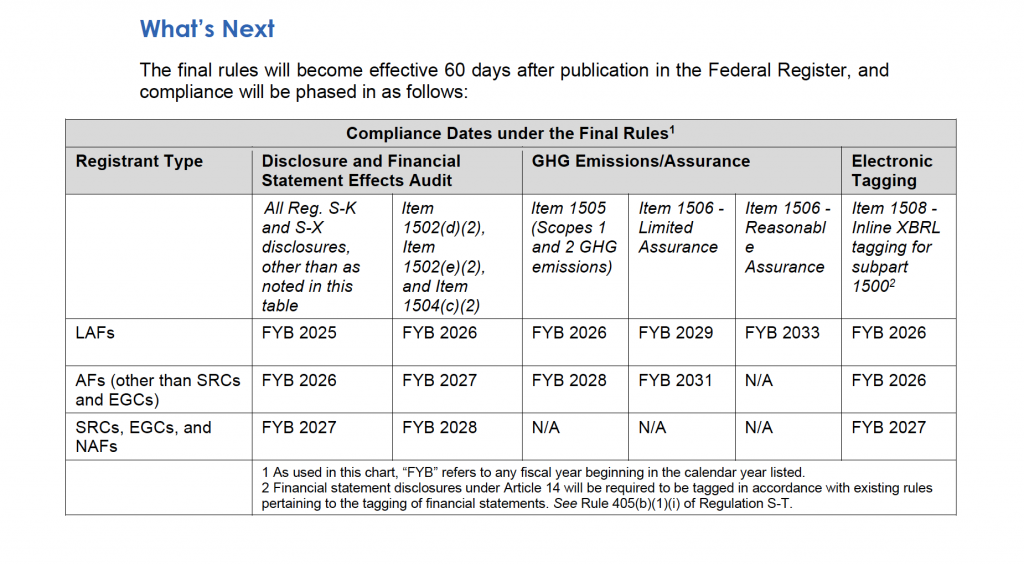The landscape of corporate sustainability reporting is undergoing a significant transformation. On March 6, 2024, the Securities and Exchange Commission (SEC) crystallized this response into action, adopting final rules that will fundamentally reshape the reporting landscape of climate-related risks and greenhouse gas emissions. This landmark decision underscores the growing recognition of environmental considerations as integral to the financial and operational facets of companies and the investment decisions of stakeholders.
The new rules, set against the backdrop of a global push for environmental accountability, signal a robust step forward in ensuring that the financial disclosures companies provide reflect the increasing importance of sustainability and transparency in corporate strategy. This regulatory milestone is expected to usher in an era where environmental stewardship is a core component of corporate governance.
The new disclosure requirements represent a concerted effort by the SEC to enhance the quality and scope of information provided to investors, enabling a more informed understanding of the risks and opportunities that climate-related issues present to businesses. This transition to more comprehensive reporting is a clear signal to the market: the era of climate awareness in financial reporting is upon us, and with it comes a new standard for corporate transparency.

Understanding the New SEC Rules:
In a significant move to enhance the quality of climate-related information available to investors, the SEC has laid out detailed requirements for registrants. All registrants will need to disclose how climate-related risks have affected or are likely to affect their business strategy, financial condition, and operating results. The disclosures will not only highlight the material impacts of climate risks but will also encompass the registrant’s strategies to mitigate or adapt to these risks, including the use of transition plans, scenario analysis, and internal carbon pricing.
Larger registrants, such as Large Accelerated Filers (LAFs) and Accelerated Filers (AFs) that are not exempted, will have additional obligations to report Scope 1 and Scope 2 GHG emissions, along with an assurance report, initially at a limited assurance level, escalating to a reasonable assurance level after a transition period. These disclosures are aimed at providing a more granular view of a company’s emissions profile and the efficacy of its response to climate-related risks.
Furthermore, the rules mandate disclosures related to the oversight and governance of climate-related risks by a registrant’s board of directors, detailing the board’s role in overseeing climate-related risks, and management’s role in assessing and managing these risks. These new requirements will compel a closer integration of climate-related risk management into the broader risk management framework of organizations, thus fostering a more holistic approach to sustainability.
The phased-in compliance period is set to give registrants ample time to adjust to the new requirements. However, the transition period is finite, and proactive engagement with these requirements is imperative.
Who Must Disclose and When:
Under the new SEC rules, all registrants, including foreign private issuers, are mandated to provide climate-related information in their filings, but the requirements vary based on the filer’s classification. Large Accelerated Filers (LAFs) will begin disclosing in fiscal year 2025, with further detailed emissions reporting and assurance levels phased in over subsequent years. Accelerated Filers (AFs) and Non-Accelerated Filers, including Smaller Reporting Companies and Emerging Growth Companies, will have similar reporting obligations but with extended timelines and certain exemptions, acknowledging the diverse capacities among companies. This tiered approach ensures that while all sectors move toward enhanced transparency, they do so in a manner calibrated to their size and market impact.

How Hydrus Can Help:
At Hydrus, we recognize the challenges and opportunities these new rules present for companies. As a leading provider of sustainability reporting solutions, we are uniquely equipped to help businesses navigate the complexities of the new SEC requirements. Here’s how Hydrus can support your company:
- Streamlined Reporting: Our platform simplifies the process of collecting, analyzing, and reporting greenhouse gas emissions data, making it easier to comply with the new disclosure requirements.
- GHG Emissions Reporting: Beyond the Scope 1 and Scope 2 emissions required by the SEC, Hydrus also supports tracking of Scope 3 emissions, helping companies stay ahead of future regulatory requirements and stakeholder expectations with global coverage.
- Data Aggregation and Consolidation: Our platform offers robust capabilities for collecting, aggregating, and consolidating data from multiple sources, providing a unified view of your climate data for accurate reporting.
- Risk Management: Hydrus helps companies identify, assess, and manage material climate-related risks, ensuring that they are adequately disclosed and addressed in line with the SEC’s rules.
- Board and Management Oversight: Our tools can assist in documenting and reporting the involvement of the board of directors and management in overseeing climate-related risks, in compliance with the new regulations.
- Goal Setting and Progress Tracking: For companies with climate-related targets or goals, Hydrus provides a framework for setting, monitoring, and reporting progress, ensuring that these efforts are accurately reflected in disclosures.
- Expert Support: Our team of sustainability experts is available to guide you through the new reporting landscape, offering insights and assistance to ensure your disclosures meet the SEC’s standards.
The SEC’s final rules on climate-related disclosures represent a significant step forward in the push for more sustainable business practices. As companies work to align their reporting with these new requirements, Hydrus stands ready to provide the tools and expertise needed to navigate this changing landscape. Together, we can embrace this opportunity to enhance transparency, accountability, and sustainability in the corporate world.
For more information on how Hydrus can help your company comply with the SEC’s new rules, visit our website or contact us today.



